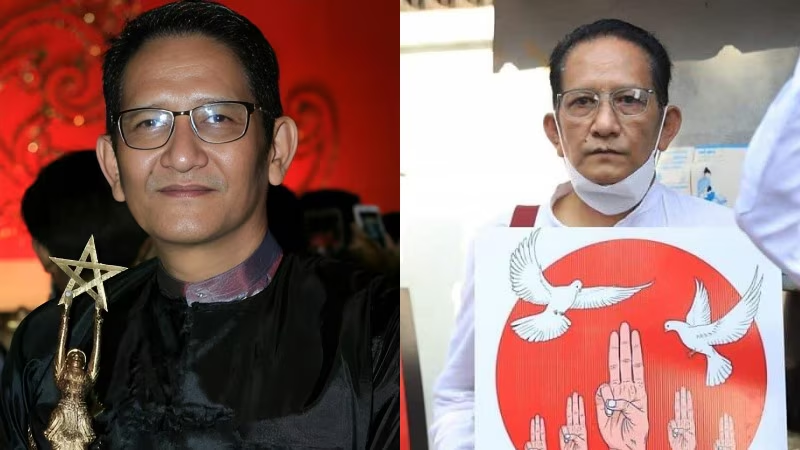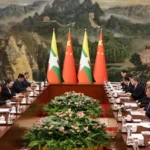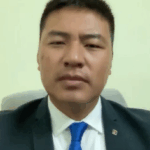
Myanmar Junta Revokes Citizenship of Actors, Singers, and Celebrities
A Life in Hiding
Zin Wine, one of the most respected figures in Myanmar’s film industry, now lives in near total seclusion. Once celebrated for his acting and leadership in the Myanmar Motion Picture Organization, he spends most of his time indoors, fearing exposure in Thailand, where he fled in 2022 after years of persecution.
In June 2023, the military junta stripped him of his Myanmar citizenship, leaving him stateless. Without any legal right to remain in Thailand, he now lives under constant fear of being recognized and reported to authorities.
“Recently, there have been so many more Myanmar people around that it is impossible to know who is who,” he told the ABC. “I only go out when absolutely necessary, but even staying at home does not feel safe.”
Citizenship as a Weapon
Since seizing power in February 2021, Myanmar’s generals have turned the country into a battlefield. The coup toppled a democratically elected government, plunging Myanmar into civil war. In the years since, the military has killed thousands, imprisoned tens of thousands, and systematically targeted political opponents.
Citizenship has become another tool in their arsenal. Dozens of opposition politicians, activists, and critics have been stripped of nationality, effectively erased from the state.
The junta justifies these actions by accusing exiles of breaking state laws, leaving the country illegally, or engaging in activities deemed harmful to national interests.
International Crisis Group adviser Richard Horsey explained that the regime is exploiting a clause in the 1982 Citizenship Law. “Those targeted typically live in exile and many rely on third-country passports to travel, as their Myanmar documents had already been cancelled,” he said.
In June this year, Zin Wine joined 13 other prominent actors, singers, and artists on the list of stateless figures.
A Veteran Critic of the Military
Zin Wine’s criticism of the military is not new. A multiple Myanmar Film Academy Award winner, he served twice as chair of the Myanmar Motion Picture Organization and has been a public advocate for democracy since the 1988 protests, when he was jailed for a year.
He was arrested again in 2021 after joining demonstrations against the coup and was later released into house arrest only after signing a pledge not to protest further. But ongoing threats against him and his family — especially linked to his son, activist and actor Min Maw Kun — forced him to flee to Thailand with his wife, Khin Nwe Nwe Tun.
He fears the consequences if he is ever forced back to Myanmar. “Even when I was still living inside the country, they had already threatened to harm my whole family,” he said.
A Broader Pattern of Erasure
The junta’s practice of revoking citizenship has roots in Myanmar’s past. During the 1988 uprisings, dissidents were punished the same way. The country’s Rohingya minority, meanwhile, have been denied citizenship for decades, leaving them stateless in their own homeland.
Shayna Bauchner of Human Rights Watch said the junta’s use of citizenship revocation is aimed at silencing and isolating critics.
“With huge numbers fleeing the country, the regime is seeking more avenues to crack down on opposition activism outside Myanmar’s borders. Revoking nationality because of free speech or politics violates international law and leaves targets at risk of statelessness, unable to work, study, or move freely.”
Horsey added that even beyond revocation, the junta’s refusal to renew passports has left thousands stranded abroad, unable to travel and at risk of deportation.

Phyu Phyu Kyaw Thein: Myanmar’s “Lady Gaga”
Another victim of the junta’s blacklist is singer Phyu Phyu Kyaw Thein, often described as Myanmar’s answer to Lady Gaga for her flamboyant stage presence and daring costumes.
She has long been outspoken on political and social issues, and in 2021 became a prime target when her song Tears — featuring footage of the violent crackdowns — went viral. The junta responded with an arrest warrant.
For months, she hid inside Myanmar before escaping across the border one rainy night. “I mustered all my courage and crossed the border by illegal route,” she said. She later secured protection in France.
From exile, she continues to perform and raise funds for displaced communities. Earlier this year, she toured Sydney and Melbourne, even addressing the New South Wales Parliament. She believes the junta targets artists like her not only for their influence but also to break the spirit of the movement.
“We are the bishops on the chessboard of the soft power games. If we are taken or hurt, it causes collective depression — the junta thinks that could bring down the unity of the revolution as a whole.”
Daung: A Stateless Star
Actor Thura Aung, better known as Daung, was among the first to lose his citizenship in 2022. A former professional footballer turned film star, he happened to be in Thailand when the coup began.
He chose not to return, instead speaking out against the generals. The junta retaliated by revoking his nationality. Though he later secured a humanitarian visa from Czechia, his life remains uncertain.
“Whenever I travel, immigration officers question me,” he said. “I am afraid of the police because I am not a citizen of any country.”
A Family Torn Apart
For Zin Wine, the greatest pain is not just fear of arrest, but separation from his family. Two of his sons, including Min Maw Kun, now live in Canberra, Australia, where they were granted asylum in 2021.
Zin Wine has twice applied for an Australian humanitarian visa — first denied in 2021, and still pending after a second application in 2022.
“The condition that they are currently living in Thailand is extremely limited even compared to other people because of their status,” Min Maw Kun said.
For Zin Wine, the hope of reunion sustains him. “At my age, it is very difficult for my wife and me to live on our own without family support,” he said. “Being close to them means everything. More than anything, I want the opportunity to stop living in fear and instead be surrounded by the warmth and support of the people I love.”
Conclusion
The junta’s campaign to revoke citizenship from artists and public figures is a chilling extension of its strategy to crush dissent. By rendering its critics stateless, the regime seeks to erase their identity, silence their voices, and sever their ties to Myanmar.
Yet, even in exile, figures like Zin Wine, Phyu Phyu Kyaw Thein, and Daung continue to speak out, perform, and advocate for democracy. Their voices echo across borders, keeping Myanmar’s struggle visible on the world stage.
The generals may take away papers, passports, and nationality — but they cannot extinguish the identity or resilience of those who continue to fight for freedom.
Credit: ABC news.net
Related posts:
 How Myanmar’s Gold Rush Puts International Rivers at Risk
How Myanmar’s Gold Rush Puts International Rivers at Risk
 Dozens Killed in Chaung-U as Myanmar Military Launches Paraglider Attack
Dozens Killed in Chaung-U as Myanmar Military Launches Paraglider Attack
 Policy Dilemmas and Stability: Bangladesh’s Approach to the Arakan Army
Policy Dilemmas and Stability: Bangladesh’s Approach to the Arakan Army
 Starlink Fuels Myanmar Scam Networks, U.S. Demands Geoblock
Starlink Fuels Myanmar Scam Networks, U.S. Demands Geoblock
 Dr. Sasa Resigns from NUG, Restructuring Expected Inside Shadow Government
Dr. Sasa Resigns from NUG, Restructuring Expected Inside Shadow Government
 Myanmar Earthquake – A Nation in Crisis Amidst Disaster
Myanmar Earthquake – A Nation in Crisis Amidst Disaster
